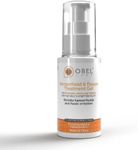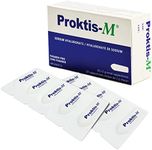Buying Guide for the Best Hemorrhoid Creams
Choosing the right hemorrhoid cream can make a big difference in how quickly and comfortably you find relief from symptoms like itching, burning, and swelling. Since everyone’s experience with hemorrhoids can be a little different, it’s important to understand what each cream offers and how it matches your specific needs. By learning about the key ingredients and features, you can make a more informed choice and get the best results for your situation.Active IngredientsActive ingredients are the main components in a hemorrhoid cream that provide relief. Common ones include hydrocortisone (for reducing inflammation and itching), lidocaine (for numbing pain), and witch hazel (for soothing and cooling). Some creams focus on one main ingredient, while others combine several. If your main problem is itching, a cream with hydrocortisone might be best. For pain, look for lidocaine. If you prefer a more natural approach, witch hazel is a gentle option. Always check the label to see which active ingredients are included and match them to your symptoms.
Type of Relief ProvidedHemorrhoid creams can offer different types of relief: some are designed to reduce swelling, others to numb pain, and some to soothe irritation. Swelling reducers are good if you have noticeable lumps or discomfort when sitting. Numbing creams are best if pain is your main issue. Soothing creams are helpful for mild irritation or after a bowel movement. Think about which symptom bothers you most and choose a cream that targets that specific problem.
Formulation (Ointment, Cream, Gel, or Suppository)Hemorrhoid treatments come in several forms: ointments, creams, gels, and suppositories. Ointments and creams are thicker and stay on the skin longer, making them good for external hemorrhoids. Gels are lighter and may feel less greasy. Suppositories are inserted into the rectum and are best for internal hemorrhoids. Choose the form that matches where your symptoms are located and what feels most comfortable for you to use.
Sensitivity and AllergiesSome people have sensitive skin or allergies to certain ingredients. Fragrance-free and hypoallergenic creams are less likely to cause irritation. If you have a history of skin reactions, look for products labeled for sensitive skin and check the ingredient list for anything you know you react to. Doing a small patch test before full use can also help prevent problems.
Duration of UseSome creams are meant for short-term use only, while others can be used for longer periods. Hydrocortisone creams, for example, should not be used for more than a week without a doctor’s advice, as overuse can thin the skin. If you expect to need relief for more than a few days, look for creams that are safe for longer use or consult a healthcare provider.








